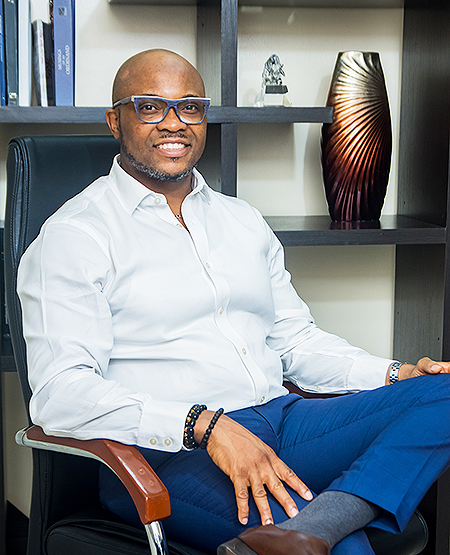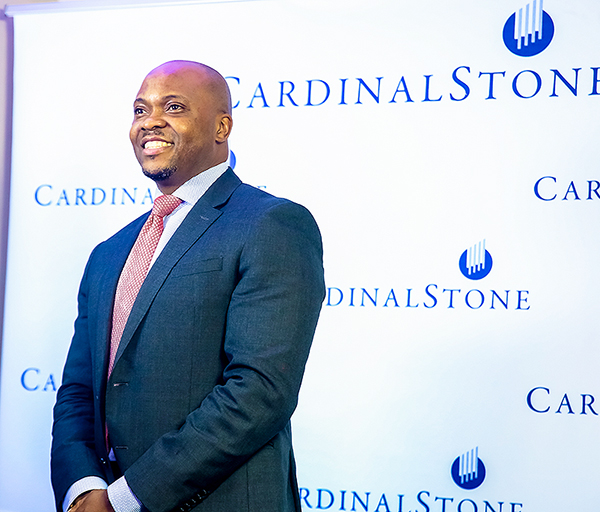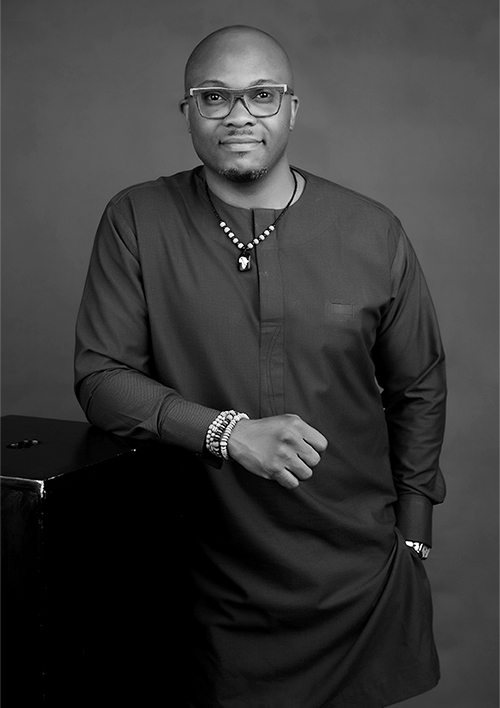Interview by Chief Editor
August 2020 15 min read

Yomi Jemibewon is one of the founders of CardinalStone Partners Limited, a Lagos-based West Africa-focused asset management firm that currently manages over $250 million across various asset classes. As a spotlight feature in our Grand Masters interview series, Yomi speaks with us about his work, enterprise beginnings in an emerging market, and shares a perspective about expansions during a pandemic. We also discuss the reception and relevance of his book Risk and Return.
(VC) In enterprise and commerce within private equity, you have an impressive portfolio of businesses. Did this happen organically or it is part of a larger plan?
(Yomi) Through our journey at CardinalStone, we have experienced different phases of our evolution, where investment decisions and partnership outcomes have been motivated or influenced by various factors. I will say we have lived through three distinct phases.
At the inception of the business, the first was a phase of highly deliberate planning and actions. My three founding partners and I came together through a carefully orchestrated self-selection process and proceeded to raise capital from a carefully assembled list of investors. We secured commitments for all the capital we wanted, quit our jobs, and started the business within four months. Everything seemed to be going better than we could ever have anticipated. We were beginning to feel like superstars.
The second phase, where we learned to become entrepreneurs, was one forged in a quest for survival in the face of an existential crisis. This was late 2008, only six months into starting the business when the global financial crises finally hit Nigeria. The sustained positive market dynamics that attracted us to start CardinalStone evaporated before our eyes, and all the underlying assumptions for the business changed. For the next 24-36 months, we transformed ourselves from investment bankers to survivalists—anything that helped us keep the lights on or grow our brand is what we did. We became real estate agents, renting our vacant office space to more prominent multinational companies—partly for the cashflow and partly for the opportunity to rub shoulders with the ‘big-boys.’ We begged to work on investment banking jobs for cheap if we’d get our names on the deal tombstones for some publicity. We consulted for companies for free so that we could get market intel and, the few times we did, we sprang into action, risking the little capital we had in trying to build or acquire new businesses. This phase was primarily driven by resilience and opportunity at a time of crisis and led to CardinalStone emerging as such a diversified platform.
The third, which is a phase we are still evolving through today, is where we gradually return to our origins of deliberate enterprise building. Coming out of 2013, we had a reasonable sense of what our institutional DNA was at CardinalStone—we knew what our strengths and deficiencies were as an institution. We had by then developed a good understanding of the nuances of our markets. It became essential to regroup and find ways to return to being more deliberate on how we took on new initiatives for growth. At the same time, deciding to invite more structured institutional capital into our business necessitated the establishment of clearer distinctions between business lines and the definition of clearer investment guidelines for each business. For example, in the private equity business that I co-head today, we seek to back high potential SMEs operating in select sectors of the Nigerian and Ghanaian economies. We are clear and deliberate on the scale, characteristics, and ambitions we look for in potential investee partners and spend a good time engaging with them, before investing, to make sure we are a good fit for each other.
With a little more courage, from the right people in our communities, more well-meaning people would be a little bolder to challenge the status quo and take action when we see things going wrong around us, even if such measures may not be so popular

Photo by Climax
(VC) A perfect world does not exist, but if one did what core values would you make a staple in the immediate community and your sphere of influence?
(Yomi) Courage, Respect, and Humility. With a little more courage, from the right people in our communities, more well-meaning people would be a little bolder to challenge the status quo and take action when we see things going wrong around us, even if such measures may not be so popular. With a little more respect and empathy for others, our efforts will be a lot less self-centered and more inclusive. And with a bit of humility, we would all realize that welcoming and leveraging input and participation from other ‘capable’ yet seemingly different members of our diverse communities would increase our chances of creating a more progressive and sustainable society.
(VC) You manage various assets in multiple industries, and like many others in private equity affected by COVID-19, what kind of long term impacts do you see with the consumer markets?
(Yomi) We have seen the COVID-19 pandemic affect different sectors in different ways. The overwhelming majority of industries have been adversely affected due to supply chain disruptions, while a handful of healthcare and food staples have proven somewhat resilient. On the flip side, some businesses, like IT and sanitation-related companies, have experienced growth through the pandemic. Fortunately, I do believe that the consumption of most products and services will, eventually, steadily return to and even surpass their pre-COVID levels. The question is, “in what form” will that consumption be, and how would different businesses need to reposition themselves to thrive in that post-COVID world. For many companies, the pandemic has raised questions about how we look at our supply chain. For example, questions on how much businesses rely on a single source for inputs and raw materials or on how much businesses depend on traditional brick and mortar marketplaces or physical channels for consumer engagement. These are some of the areas every company must evaluate carefully going forward. Today at CardinalStone, we are reassessing all our existing and prospective businesses for supply chain resilience and paying particular attention to opportunities to leverage technology for efficiencies and risk management. COVID has taught us that these considerations are no longer just ‘nice to haves’ but could be the difference-maker for survival or competitiveness in a post COVID world.
In recent times, we are seeing the majority of our best local ideas come directly from Africans. Some of these are people of African origin repatriating from the diaspora to start local businesses on their own or in partnerships with locals.
(VC) Many critics may counter-argue that locally born ideas are not really local because the African continent is in her second economic scramble, and many multinational companies are already contributing to the continent. What are your general thoughts on this?
(Yomi) I would agree that locally born ideas are not really “local”; nor should we require them to be. But not particularly for a reason mentioned in your question. In my opinion, the African continent should welcome all ideas that prove to be locally relevant and progressive to its people, regardless of where they come. From my observations, some of our most progressive ideas across Africa have come from groups who have found ways to combine an appreciation for our local context with solutions inspired by experiences beyond our borders. There was a time when this mix came primarily from expatriates and multinational corporations. But unfortunately, some of that was in the process of some form of exploitative engagement with host African communities. In recent times, we are seeing the majority of our best local ideas come directly from Africans. Some of these are people of African origin repatriating from the diaspora to start local businesses on their own or in partnerships with locals. Others are locals who return home with a unique spark after a brief stint or exposure abroad. On a more general note, though, in today’s interconnected world where our phones give us instant access to messages, images, and trends from all corners of the world as inspiration, can any idea claim to be “truly local”?
(VC) When should a small business look to go public, and what would make it attractive for private equity investors or brokers
(Yomi) Going public? Possibly never for small businesses. Public markets typically have requirements, complexities, and idiosyncrasies that require businesses to have a certain degree of scale, financial history, and governance structures in place. As such, the cost and bar will likely be too high for most small or medium-sized businesses.
A more practical avenue for smaller businesses to access capital is via direct investment from institutional investors through a structured fund-raising process with financial advisers’ help. Though still quite a high bar for most small businesses, the requirement here is significantly lower than that of going public for two reasons. First, this type of capital raise is typically only open to a closed list of qualified investors and not the public. Qualified investors, such as private equity firms, strategic operators, and pension funds, are expected to be savvy and have enough technical understanding and resources to evaluate the risks of making such investment decisions appropriately. Second is that investors participating in such raises typically have different and unique investment objectives. Many times, only a single or sub-set of such investors end up being a match with the company seeking capital. Typically a business would explore this avenue of capital raising if a new capital injection is needed to capture a significant growth opportunity, restructure or solve a burning problem, and where shareholders want to get a partial or full exit from the business.
What makes a business attractive to investors? Different investors look for different things, but we are all looking to invest in companies that can deliver strong returns. The difference between investors comes in the form of returns we each seek, our unique propensity to risk, and the unique ways we each assess a business for attractiveness and fit. In general, some of the factors all investors evaluate are the founders’ and management team’s motivation and credibility, the operating and financial history of the business, confidence in management’s ability to deliver on its growth projections, and comfort with the governance structures and processes in place. Because of the considerable amount of work and time it takes to prepare a company for presentation to potential investors, investment banks and advisers will typically only accept such mandates from businesses they believe present a high likelihood of success.
(VC) What do you tell aspiring young entrepreneurs about the risk and realities of the business world in frontier markets and emerging economies such as yours?
(Yomi) Too many things. I am not sure we have enough time for me to share all of that today [Yomi smiles]. I will however share three of the points I find myself repeating quite a bit.
The first is that in any market, entrepreneurship is a marathon that will present many challenges and, in some cases, near-fatal ones, so one should be ready for the long-haul. I advise entrepreneurs not to get discouraged by the hits and failures that come, but to focus on learning and responding to them, prioritizing staying alive and relevant until their first big break; then to get ready to repeat the cycle until the next break, then the next. In the same vein, I tell them not to get carried away with the big breaks or momentary successes when they do come, because those too shall pass, and new challenges will present again. So equally, they should take the blessings from their wins to shore up their base in preparation for the next set of hits.
Second, in frontier markets such as ours, where physical infrastructure and the economic, regulatory, and legal structures are still largely evolving, the strength of a business’s relationships and social capital can often be more important for success than all of its financial and intellectual capital. Relationships are key here and often being liked, or better yet, not being hated, may be the factor that makes the difference between survival and failure or excelling and remaining mediocre. I advise entrepreneurs to stay humble even when being bold; to remain respectful and tempered when communicating frustration; to avoid burning bridges wherever possible, also if it sometimes requires turning the other cheek.
When you are looking at extinction in the face and there are compelling shortcuts that present an easier path to early or unimaginable success. sometimes, remembering those people you are accountable to is the only thing that keeps you honest
The third is for entrepreneurs to seek out credible people to be accountable to. Many aspiring entrepreneurs can’t wait to become the captains of their own ships with no one to report or be accountable to. Our market is one that will continuously throw curveballs at you, and many times your principles and ethics will be tested. When you are looking at extinction in the face and there are compelling shortcuts that present an easier path to early or unimaginable success. sometimes, remembering those people you are accountable to is the only thing that keeps you honest. For some, this could be achieved by assembling credible shareholders, the board of directors, or advisers; for others, it could be using family or a committee of trusted employees as a sounding board from time to time. Whatever your preferred approach is, just find a way to get some credible people that can help keep you in check.
(VC) Some mention different historical times as a period they admire for affluence or culture. If you could time-warp to any era to collaborate with its culture, what period would it be and why?
(Yomi) The period covering the 60s and the 70s, when different countries across Africa successfully winning independence one after the other in rapid succession. This period ushered in a time of great optimism for the continent. The canvas was still blank, life was still simple then, and there was a sense of pride amongst Africans and a great deal of anticipation of things to come. This time also coincided with the emergence of specific music genres and fashion styles that have stayed with us in some form till today. This was the period of the emergence of Nigerian artists like Fela Kuti and King Sunny Ade and international artists like Bob Barley and the Beatles. It was also the time of the reign of the afro hairstyle and the retro fashion of colorful print shirts and bell-bottom pants. That would have been a cool time to have been alive.
(VC) At this stage of your collective accomplishments, If you can work alongside any international public figure, brand, or enterprise. Who would it or they be, and why?
(Yomi) Since you made this such an open question, I have gone with a pick that has nothing to do with my day job. My pick would be Beyonce and Jay Z as a team. First, for quite some time now, they both individually and in recent times together have been releasing bangers (music hits) that have offered me some form of release from my often stressful day-to-day. Second, I find the personal life journeys of both artists, and how this is reflected in the continuous evolution of their art form, inspiring and aspirational in many regards. Third, they have found their unique way to foster their brand of a functional relationship in the face of so much public scrutiny, speculation, and judgment. To me, by just being who they are, they are unconsciously and unapologetically serving as a reference point for many to emulate and as a strong positive influence on the image of black people to the rest of the world. And doing so without taking themselves too seriously. I would be honored to have what I do cross paths with what they do someday or just to grab a drink with them [Yomi smiles].

Photo courtesy CardinalStone
(VC) You have authored a book Risk and Return, how has the reception been, and where can our audience access it?
(Yomi) The reception to Risk and Return has been pleasantly surprising. I wrote the book at a time of great personal reflection on the motivations, experiences, failures, and successes from my return home to Nigeria after spending 14 years in the US. Since its release, the book has continued to resonate strongly with all readers, especially with readers of African lineage—seeking inspiration on ways to reconnect with their African roots or looking for encouragement to take a leap of faith towards a much-needed life change. Its message is even more apt now with all that is going on with the Black Lives Matter movement.
Despite being self-published with no deliberate marketing drive, interest in the book continues to be propelled organically by word of mouth recommendations and reader reviews on Amazon and social media. International readers can pick up a copy in paperback and e-book format on Amazon and audiobook formats on Amazon, Audible, Scribd, and Audiobookstore.
(VC) Thanks for speaking with us Yomi. Is there anything else you would like to share with our international audience?
(Yomi) Thanks for having me; I have also enjoyed our time together. To your audience, I’d say I hope they all find ways to keep safe, stay positive, and enjoy time with loved ones during these COVID times. This is a good time for us to reflect on what is most important in life, consider some new commitments and life changes, and maybe even swing for the fences where we’ve been holding back. We only live once, and there may be no better time to take that leap than now.